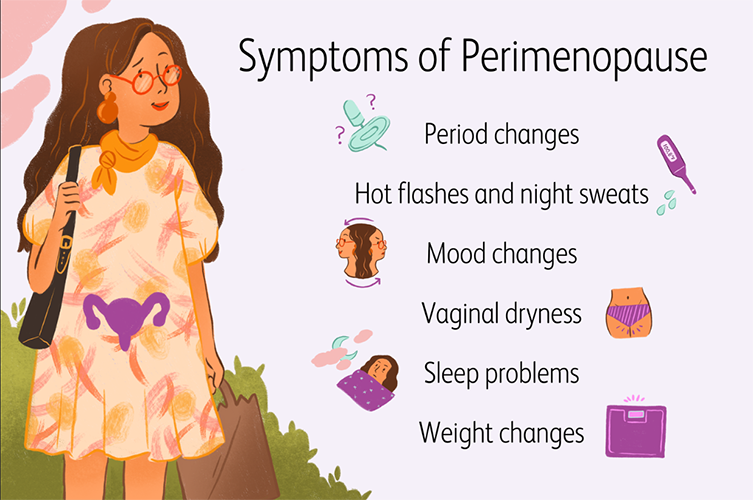Common Symptoms of Perimenopause | Early Signs & Care Guide

Common symptoms of perimenopause: A complete Guide
Introduction
Perimenopause is a natural phase every woman eventually experiences, yet it often arrives with unexpected changes. Hormonal fluctuations, especially in estrogen and progesterone, lead to a variety of physical and emotional symptoms. While this transition is entirely normal, recognizing its signs early helps women prepare, manage discomfort, and maintain overall well-being.
What is Perimenopause? (Perimenopause Meaning)
Perimenopause refers to the transitional years leading up to menopause, when the ovaries gradually produce less estrogen. Unlike menopause, which is confirmed after 12 months without menstruation, perimenopause can last several years. During this time, cycles may become unpredictable, and a wide range of symptoms may appear, reflecting the body’s adjustment to changing hormones. Perimenopause begins about eight to 10 years before menopause. It usually starts in your mid-40s, but it can start earlier.
Perimenopause vs. Menopause: What’s the Difference?
- In simple terms, Perimenopause means a gradual transition period, often beginning in the 40s, marked by fluctuating hormones and irregular cycles.
- Menopause is reached once a woman has gone 12 consecutive months without a period, signaling the end of fertility.
In short, perimenopause is the journey, while menopause is the destination.
The Most Common Symptoms of Perimenopause
Hormonal shifts affect nearly every system in the body. Symptoms vary in intensity, but the following are most commonly experienced:
- Irregular Periods
As ovulation becomes more unpredictable, the time between periods may be longer or shorter, your flow may be light to heavy, and you may skip some periods. If the length of your periods is consistently different by seven days or more, you may be in early perimenopause. These irregularities are among the earliest symptoms of perimenopause. - Hot Flashes and Night Sweats
Perimenopause symptoms include sudden waves of heat, flushing, or sweating, which are hallmark symptoms. Night sweats can disrupt sleep, leaving women fatigued and irritable the next day. - Mood Swings and Irritability
Fluctuating hormones can affect neurotransmitters, leading to irritability, sadness, or mood swings. Some women report increased anxiety or even depressive episodes. - Sleep Problems (Insomnia)
Sleep is a common concern among women in the menopause transition. Difficulty falling asleep, staying asleep, or waking early in the morning becomes common. Night sweats may worsen sleep disturbances. - Vaginal Dryness
Reduced estrogen levels lead to thinning and drying of vaginal tissues. This can cause discomfort during intercourse and increase susceptibility to infections. - Brain Fog and Difficulty Concentrating
Many women describe lapses in memory, reduced focus, or a general “mental cloudiness” during this stage. - Changes in Libido
Sexual desire may decrease due to hormonal changes, vaginal dryness, or psychological factors, though some women experience the opposite. - Weight Gain
Slower metabolism, hormonal imbalance, and aging together make weight gain, particularly around the abdomen, more likely during perimenopause
Managing Perimenopause Symptoms: Lifestyle and Diet
While perimenopause is inevitable, perimenopause symptoms can often be managed with the right approach.
- Regular Exercise: Walking, yoga, strength training, or swimming improves mood, supports bone health, and helps manage weight.
- Stress Management: Meditation, breathing exercises, or journaling reduce anxiety and promote emotional balance.
- Adequate Sleep: Maintaining consistent sleep hygiene is vital. Avoid caffeine and screen time before bed.
- Medical Guidance: Hormonal or non-hormonal therapies may be considered if symptoms interfere with quality of life.
The Best Perimenopause Diet for Symptom Relief
A nutrient-dense perimenopause diet helps stabilize hormones and supports overall health.
- Phytoestrogen-rich foods: Soy, flaxseeds, chickpeas, and lentils can mimic estrogen activity mildly.
- Calcium & Vitamin D: Dairy, leafy greens, and fortified foods protect bone density.
- Whole grains & fiber: Brown rice, oats, and quinoa aid digestion and support heart health.
- Healthy fats: Avocados, nuts, and olive oil reduce inflammation.
- Limit sugar, alcohol, and caffeine: These can worsen hot flashes and sleep issues.
When to See a Doctor
Although perimenopause is natural, certain symptoms warrant medical evaluation:
- Extremely heavy bleeding or blood clots
- Periods occurring very close together (every 2-3 weeks)
- Severe hot flashes or insomnia affecting daily life.
- Mood changes such as persistent depression or anxiety
- Painful intercourse due to vaginal dryness
- Unexplained weight loss or unusual symptoms
A healthcare provider can recommend lifestyle changes, supplements, or therapies tailored to individual needs. Along with this, a perimenopause diet helps with the perimenopause symptoms and supports overall female health.
Conclusion
Perimenopause is a significant milestone, marking the transition from reproductive years into menopause. It’s a natural and normal progression, but it comes with both physical and emotional symptoms. Some of these symptoms can disrupt your life or make you uncomfortable. Understanding its symptoms allows women to embrace this phase with confidence rather than confusion. With balanced nutrition, mindful lifestyle habits, and timely medical advice, the challenges of perimenopause can be managed effectively, paving the way for a healthy and fulfilling life.
FAQ
What are the first symptoms of perimenopause?
Irregular periods are often the earliest symptoms of perimenopause. Women may also notice mood swings, hot flashes, or sleep disturbances. These changes usually begin subtly before becoming more pronounced.
At what age does perimenopause usually start?
Perimenopause typically starts between 40 and 45 years, though it can begin earlier or later depending on genetics, lifestyle, and overall health.
How long does perimenopause last before menopause?
The duration varies widely but generally lasts 4 to 8 years before reaching menopause. Some women may experience it for a shorter or longer period.
What is the meaning of perimenopause in Hindi?
Perimenopause in Hindi is often described as रजोनिवृत्ति से पहले की अवस्था, meaning the transitional phase before menopause.
Which diet is best during perimenopause?
A perimenopause diet is rich in phytoestrogens, calcium, vitamin D, whole grains, fruits, and healthy fats, which help relieve symptoms. Reducing sugar, processed food, and caffeine is equally important.
Can perimenopause symptoms be managed naturally?
Yes, lifestyle changes such as regular exercise, stress management, yoga, and a nutrient-dense diet can help. Herbal supplements may also offer relief when guided by a professional.
Can perimenopause cause anxiety?
Yes. Hormonal fluctuations affect mood-regulating chemicals in the brain, often leading to anxiety or irritability. Stress reduction practices and medical support can ease these symptoms.
About Dr. Kalpit Acharya
- Kalpit Acharya is a dedicated and passionate Ayush Surgeon, with expertise in various surgical procedures including Abdominal surgeries & Ano rectal surgeries, wound management and Ayurvedic para-surgical procedures. Combining his clinical expertise with a strong academic foundation in M.S. General Surgery (Shalya Tantra).
- He has achieved notable recognition, including winning prizes in prestigious competitions like SANGAM 2024 @ IIT BOMBAY and AAVISHKAR 2024. Additionally, Dr. Acharya was awarded for his research in the field of Ayurveda and modern medicine at IIT Bombay, IIT Delhi, and ACTREC TMC.
- Dr. Acharya is committed to providing Surgical & holistic care that addresses the physical, mental, and spiritual well-being of his patients through the integration of Ayurvedic principles and modern medical knowledge.








